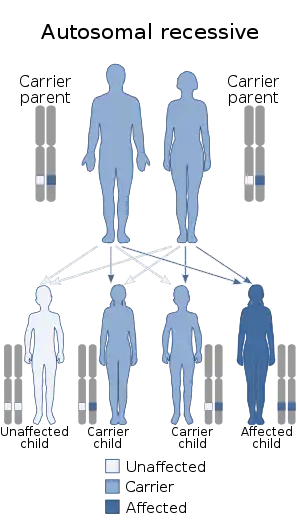Adrenocorticotropic hormone deficiency
Adrenocorticotropic hormone deficiency is a result of a decreased or absent production of adrenocorticotropic hormone (ACTH) by the pituitary gland.[1] It can be associated with TBX19.[2]
| Adrenocorticotropic hormone deficiency | |
|---|---|
| Other names | ACTH deficiency |
 | |
| Autosomal recessive is the manner in which this condition is inherited | |
| Specialty | Endocrinology |
Presentation
Symptoms include weakness, hypoglycemia, weight loss and decreased axillary and pubic hair. It can be either isolated or part of a generalised pituitary dysfunction. It can be life-threatening if not recognised.
Diagnosis
It is usually diagnosed on basis of an ACTH or insulin tolerance test in combination with the clinical symptoms.[3]
Treatment
Treatment is with hydrocortisone supplementation.
See also
References
- Drouin J, Bilodeau S, Vallette S (September 2007). "Of old and new diseases: genetics of pituitary ACTH excess (Cushing) and deficiency". Clin. Genet. 72 (3): 175–82. doi:10.1111/j.1399-0004.2007.00877.x. PMID 17718852. S2CID 25671033.
- Lamolet B, Pulichino AM, Lamonerie T, et al. (March 2001). "A pituitary cell-restricted T box factor, Tpit, activates POMC transcription in cooperation with Pitx homeoproteins". Cell. 104 (6): 849–59. doi:10.1016/S0092-8674(01)00282-3. PMID 11290323. S2CID 18054879.
- Cooper MS, Stewart PM (January 2005). "Diagnosis and treatment of ACTH deficiency". Rev Endocr Metab Disord. 6 (1): 47–54. doi:10.1007/s11154-005-5224-0. PMID 15711914. S2CID 27036419.
External links
This article is issued from Wikipedia. The text is licensed under Creative Commons - Attribution - Sharealike. Additional terms may apply for the media files.